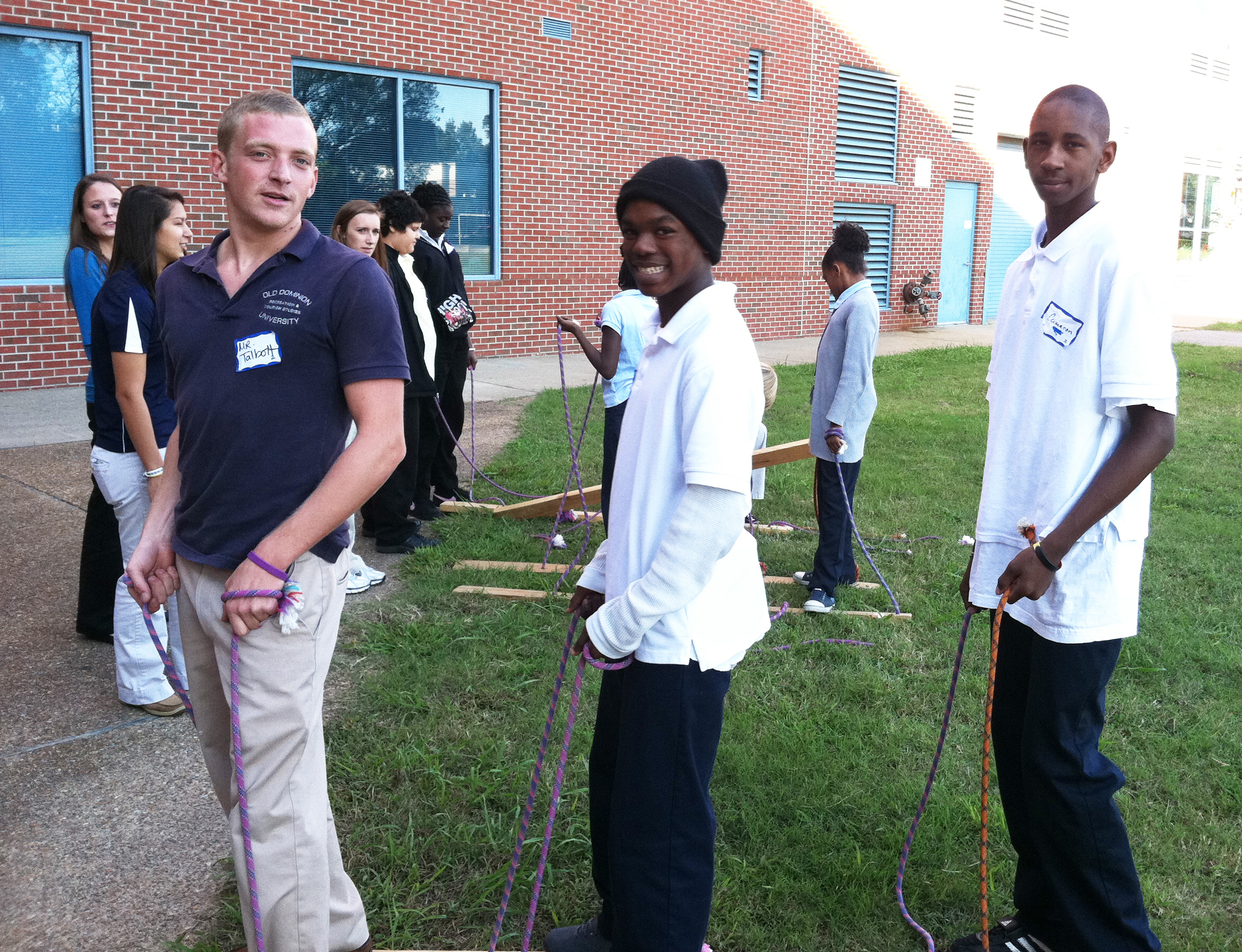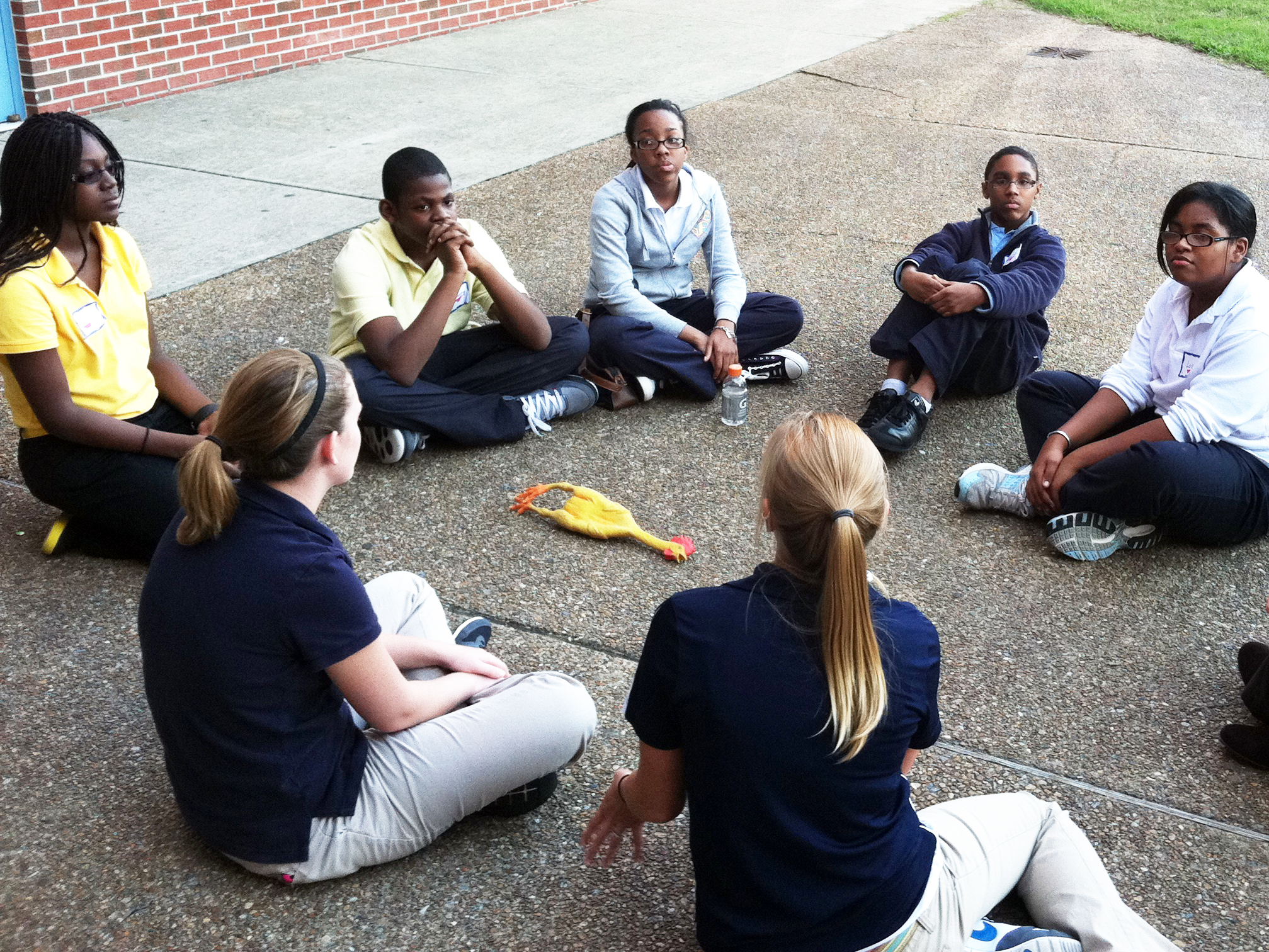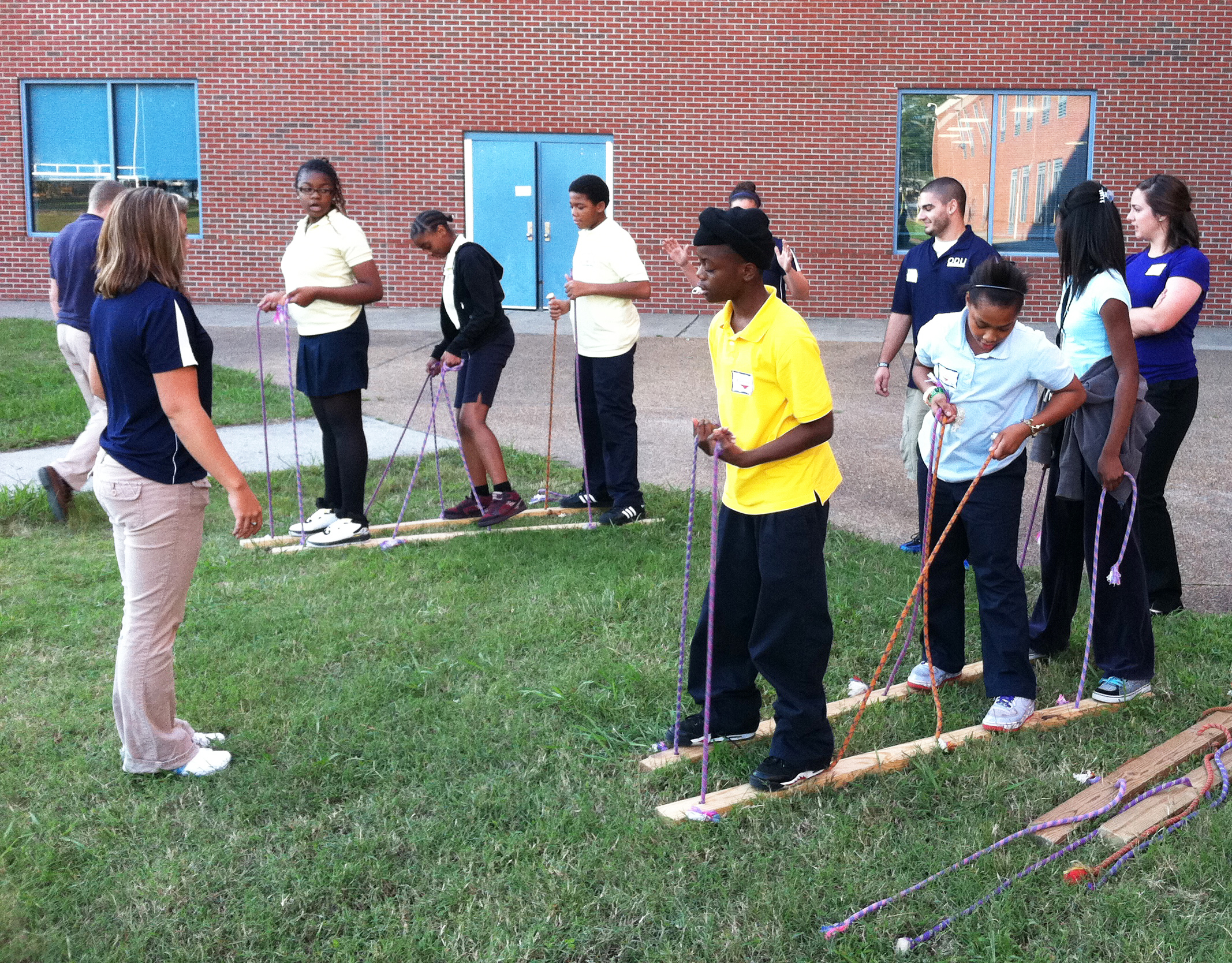CARE Now Program Helps Ease Transition to Middle and High School for Disadvantaged Students
 ODU CARE Now advocate Kyle Talbott works with students from Norfolk's Lafayette-Winona Middle School on their “Australian Trolley” activity, which requires participants to work together as they move forward on their planks. Other ODU students pictured are, from left: Lauren Siko, Karen Walker and Amanda Fluharty.
ODU CARE Now advocate Kyle Talbott works with students from Norfolk's Lafayette-Winona Middle School on their “Australian Trolley” activity, which requires participants to work together as they move forward on their planks. Other ODU students pictured are, from left: Lauren Siko, Karen Walker and Amanda Fluharty.
By Joy Mueni Maweu
The Darden College of Education's CARE Now (Character and Resiliency Education: Now) program continues to work as a successful platform, offering an opportunity for Old Dominion undergraduate and graduate students in the counseling and human services and human movement sciences departments to gain valuable field placement, practicum and internship experience in local public schools. In turn, the program is helping produce positive results in many of the young lives these students touch.
Both undergraduate and master's-level students work as advocates in the schools to provide consistent academic and social support in classes, weekly classroom lessons on character and resilience, and after-school programming aligned with topics addressed during the school day.
With its primary goal of enhancing academic achievement, CARE Now is geared toward easing the transition to middle school and high school for disadvantaged students with poor academic records and insufficient coping skills.
The program was established six years ago by Tammi Milliken, associate professor of counseling and human services, and Eddie Hill, assistant professor of human movement sciences. It started at Norfolk's Blair Middle School and has since expanded to Phoebus High School in Hampton, the city of Hampton's summer school, Norfolk's Lafayette-Winona Middle School and Norfolk's P.B. Young, Sr. Elementary School.
Aligned with the Positive Behavior Interventions and Supports Model (PBIS), CARE Now's interventions are three fold; 1) large-group activities for all students; 2) small-group activities for students with greater risk of academic failure; and 3) individual attention to students with the greatest social-emotional disruption. In- and after-school programming is facilitated by the ODU students, who are known as advocates. They are paired with a classroom teacher and work both within the classroom and outside of it to help provide an academic environment that is optimized for learning.
Jennifer Goff, CARE Now co-director and current doctoral student of human movement sciences, said: "CARE Now is effective because our students are trained facilitators who care for the children they are working with. These advocates have an intrinsic motivation to better their community and the lives of others. The ability to stay positive, form healthy relationships with students, staff and fellow advocates, and have fun with the children creates a safe and nurturing place for them to express themselves. Our advocates are what make us so successful."
This semester, approximately 75 ODU advocates are working in the four CARE Now schools. Recently, CARE Now invited students in related fields from Hampton University, Christopher Newport University and the College of William and Mary to be part of this rewarding and professional-building program.
The counseling and human services department advocates facilitate programming in school Monday through Thursday. Individual students' social and emotional issues that interfere with learning are addressed one-on-one. To address character and resilience traits with all of the students, intentionally designed guidance lessons are presented by the advocates to each class weekly. During lunch, "Grub" groups are offered throughout the week, where creative games and discussion on resilience and character traits are highlighted with small groups of students.
During the twice-per-week after-school portion of the programming, supervised human movement sciences advocates are assisted by the VHS advocates to provide snacks, an hour of math tutoring, small- and large-group intentional recreation activities related to positive character and resilience traits, and opportunities for individual attention. The after-school activities include cooperative team-building exercises that also include math as part of the experience. The after-school component utilizes a small-group problem-solving approach by dividing the middle school students into six groups. Specific activities are then selected to promote the trait of the week.
"The CARE Now program focuses on the enhancement of character and resiliency because of the established, inextricable link to academic achievement and positive youth development," said Milliken.
The impact of the program is undeniable. It has contributed to consistent and improved results, as shown in the research collected in the last few years, Hill said. Results have indicated that SOL scores improved by 8.12 percent (high school) and 20 percent (middle school). Average final grades increased by 67.13 percent, while pre-test to post-test grades improved as follows: algebra, 25.37 percent, and geometry, 33.17 percent. Further, in math there was an increase in A's (7 percent) and a similar decrease in E's.
"On the character and resiliency front, pre-post data collection on character and resilience tests indicated a significant and stable positive increase in resilience for male participants," Milliken said. "These results are significant to society at large because building character, which is not innate, is linked to the increase of individuals' ability to participate successfully in a democratic society."
Debbie Clark (2001 ODU graduate with a master's in counseling) is a former advocate and current CARE Now co-director. She has observed the connection between the students and advocates. "The CARE Now advocates provide a strong presence for the students, which I believe, sends a message of unconditional support and encouragement, opening up areas for growth and learning," Clark said.
Cleveland Radford (2012 ODU graduate with a bachelor's degree in human services), also a CARE Now co-director, was once a former advocate in the program. He said it gave him hands-on experience as an undergraduate student. "I was able to use the knowledge and skills I learned in human services and apply them in a real life setting," he said.
With CARE Now's recent inclusion at P.B. Young Elementary, the newest director to CARE Now, Jamie Bower (first-year doctoral student in ODU's counselor education program, remarked on the advantage of this addition: "It is important to reach out to kids at an earlier age to help build their character and resilience before they are in middle and high school. Also, when students are transitioning to middle school or high school, relationships connected to CARE Now from earlier can continue there as well. I really wish I had a program like this at my school when I was growing up."
While the CARE Now focus has been, from its inception, the students, the teachers in turn have benefited positively from the program's impact on their students. "Teachers' qualitative data have indicated a positive response to programming infused in their classrooms as a result of higher levels of student focus on math, fewer disruptions, less redirection and more time-on-task, and less stress on teachers, Milliken said.
Pertaining to the teachers who were interviewed about the program, she added, "Primarily because of our presence [CARE Now], they felt they had more time to focus on teaching, they weren't as distracted by student issues and they had a more positive classroom environment. They noticed a heightened level of student focus in the classroom."
Further, teachers have been influenced on how they handle difficult student situations because of the long-term presence of the advocates in the classroom. Kris Rodriguez, another co-director, was particularly impressed recently by a teacher's interaction with a student in the hallway after an inappropriate outburst in class. "The teacher sounded like [a CARE Now] advocate. The teacher took time to explore things with the child to help them be more successful in class. I believe this positive interaction is due to CARE Now's influence in the school over the past six years," she said.
Catherine Dellen, a 1995 ODU graduate with a degree in human services counseling and current CARE Now co-director, said of the program: "CARE Now is effective because it is all about the kids. It teaches them to care for self and others. It gives them tools that can last a lifetime."
Since its inception six years ago, CARE Now consistently has been awarded funding from different sources, including a total of $300,000 in grants from the Virginia Department of Education's 21st Century Community Learning Centers; $90,000 from the City of Norfolk; $65,000 from United Way; and smaller amounts from various other sponsors, including Bank of America and the Hampton Roads Community Foundation. For the 2012-13 academic year, total funding for CARE Now topped $140,000.
Joy Mueni Maweu is a Ph.D. student in the Darden College of Education's counseling program.
 ODU CARE Now advocates meet in a small-group setting with students at Norfolk's Lafayette-Winona Middle School.
ODU CARE Now advocates meet in a small-group setting with students at Norfolk's Lafayette-Winona Middle School.
 Anna Stark, left, an ODU CARE Now advocate, gives instructions to students from Norfolk's Lafayette-Winona Middle School for starting their 'Australian Trolley' exercise. ODU students pictured at back right are Mike Nichols and Karen Walker.
Anna Stark, left, an ODU CARE Now advocate, gives instructions to students from Norfolk's Lafayette-Winona Middle School for starting their 'Australian Trolley' exercise. ODU students pictured at back right are Mike Nichols and Karen Walker.

